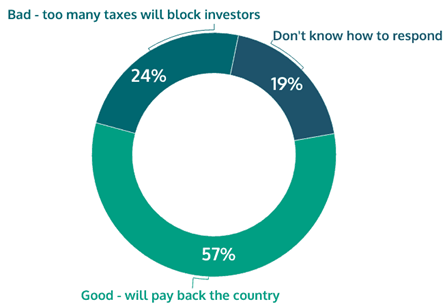Current Brazilian Regulation
In 2023, Brazilian president Luiz Inácio “Lula” da Silva approved a new gaming legislation with the passage of Law 14.790/23, which formally legalizes online casinos and sports betting, and amends previous legislation. This law aims to ensure safety, fairness, and responsible gaming while contributing to Brazil's social and economic goals.
To become a regulated operator in Brazil, you must pay a R$30 million fee and obtain a license, valid for five years and allowing up to three brands per company. Operators are taxed at 12%, and players' winnings are taxed at 15% when above R$2.259.20. This tax revenue will be used to support education, public security, sports, social security, tourism, and health, with funds allocated to diversified sectors. As found in this study by ENV Media, most Brazilians are happy with the taxation, since they believe it will improve the country's welfare.
The law sets guidelines for authorization and operation, including customer service, anti-money laundering, responsible gaming, and fraud prevention. Although it was already a big step for Brazilian legislation regarding gambling, people still felt like it needed a greater change to formalize gambling and secure the market.
What Changed
The newly introduced legislation was approved on the last 17 of April. The proposition changes this scenario by allowing each state in Brazil to issue a limit of one casino per state and in the Federal District. Exceptions include São Paulo, which can have up to three casinos, and Minas Gerais, Rio de Janeiro, Amazonas, and Pará, each of which can have up to two casinos. The proposal also allows for gambling houses on maritime and river vessels, which will follow specific regulations. To get their license, casinos must demonstrate a minimum fully paid-up capital of at least R$100 million and can be licensed for 30 years.
This law aims to regulate the establishment and operation of physical casinos, ensuring they meet high standards of security, fairness, and responsibility. The goal is to create a controlled environment where gambling can be both enjoyable and safe for participants.
However, it’s still important to note that the limited number of licenses may pose challenges. It will be difficult to meet the demand and satisfy all potential operators and gamblers. This limitation could lead to intense competition for licenses and may not entirely eliminate illegal gambling activities, as some regions and players might still seek unlicensed alternatives. At first, licensing may require heavy fiscalizing and operators can be offered alternatives when not able to get their physical casinos’ permissions.
Who Benefits From It?
The approval of physical casinos is expected to benefit various stakeholders. Firstly, the states with the highest gambling activity, such as São Paulo and Rio de Janeiro, will likely see significant economic boosts from the influx of tourists and increased local spending.
According to a study by https://www.kto.com/pt/cassino/, the six most active states in online betting and casinos in Brazil are São Paulo, Minas Gerais, Rio de Janeiro, Paraná, Rio Grande do Sul, and Santa Catarina. Residents of capital cities or metropolitan regions tend to have more interest and opportunities to gamble online due to better economic conditions and access to technology.
The regulation of gambling has already demonstrated its effectiveness, with sector employment increasing by 37% in Brazil. The demand for qualified workers and advancements in technology are also expected to create new job opportunities and foster development in various areas. Overall, the future of Brazilian casinos looks promising, with significant potential for economic growth and job creation.

 EN
EN  čeština
čeština  Polski
Polski  Slovenčina
Slovenčina  Русский
Русский  Deutsch
Deutsch  Slovenski
Slovenski  Dutch
Dutch  Svenska
Svenska  Português
Português  Italiano
Italiano  Español
Español  Français
Français  Suomalainen
Suomalainen  Български
Български  Românesc
Românesc  Magyar
Magyar  Eesti
Eesti  Ελληνική
Ελληνική  Latviešu
Latviešu  Lietuvių
Lietuvių  やまと
やまと  中国
中国  Dansk
Dansk  Türkçe
Türkçe  ID
ID  Українська
Українська  한국어
한국어  Norsk
Norsk  Peter Sommer
Peter Sommer 







You have to be logged in to add a comment